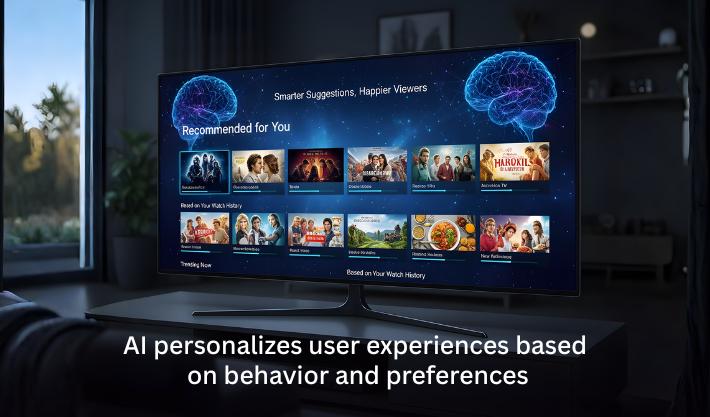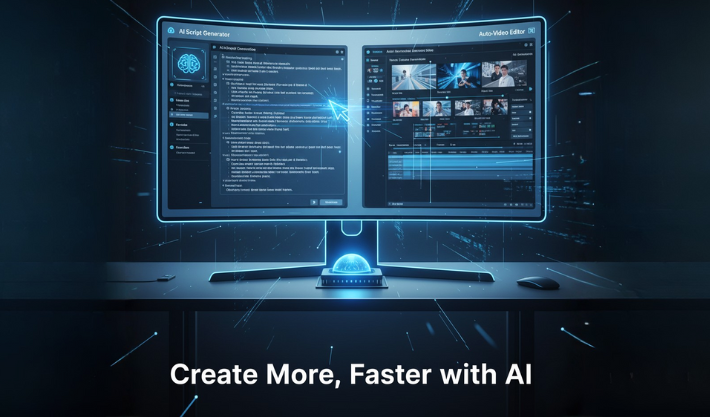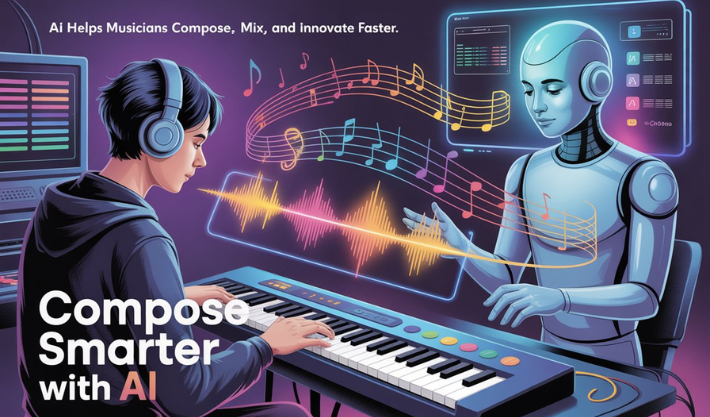

Artificial Intelligence brings innovation, automation, and efficiency to different industries. Growing very quickly within the industries of media and entertainment, AI helps content creators, producers, and marketers better optimize their work. Creativity in entertainment is enhanced, user experience, improved, and repetitive tasks, automated with the use of AI.
From personal recommendations to video editing and automated content creation, AI applications are creating a new future for the entertainment sector. In this blog, we’ll explore how AI in media and entertainment is driving innovation and shaping the future of digital content.

Artificial intelligence is also being used by streaming and digital media services to study user behavior in order to come up with personalized content suggestions. Machine learning algorithms find out the viewing habits and preferences in genres as well as engagement history and recommend relevant movies, TV shows, and musical content.
This technology of the AI in the entertainment industry has really benefited the platforms in terms of getting better customer satisfaction and retention through personalized experiences. AI also adds value to the recommendation engines in bringing the user into engagement with media that fits individual personal interests.

Artificial Intelligence provides high-quality content for media channels. Automated AI tools produce articles, video scripts, and marketing materials by identifying trends and preferences among users. AI applications in entertainment create automatic content for businesses, saving time and resources.
AI-generated content is used for journalism, sports broadcasting, advertisement, and other industries. It serves to make entertainment not just possible but also efficient when it comes to the quality of work produced. AI storytelling engines can be used to develop fascinating stories for both film and digital media.

AI-enabled tools create music through a detailed analysis of patterns, beats, and rhythms. Generally, these tools assist musicians in creating unique compositions and background scores to complement them. AI in media and entertainment can enhance audio production by noiseless and refined-sounding audio and by frequency adjustments.
It is also useful to an artist with voice synthesis and music mixing applications that can create professional-sounding audio content. This is what AI is doing to level the playing field in entertainment for productivity and accessibility in music creation. AI-augmented enhancements have even made a significant impact on sound quality in streaming services, podcasts, and film production.
AI simplifies video editing by automating tasks like scene segmentation, color correction, and visual effects. AI-driven tools analyze footage and apply real-time enhancements, making post-production faster. AI in the entertainment industry enables filmmakers to improve video quality with minimal manual effort. AI-powered editing software assists in background removal, motion tracking, and visual effects creation.
This use of AI in entertainment ensures high-quality video production while reducing costs. AI-driven deepfake technology also enhances digital storytelling and character animation.
AI improves gaming by creating smarter non-player characters, generating procedural content, and enhancing game mechanics. AI-powered algorithms analyze player behavior and adjust difficulty levels accordingly. AI applications in entertainment help game developers create realistic environments and interactive storytelling.
AI-driven NPCs adapt to player choices, providing more engaging experiences. This use of AI in entertainment also enhances game graphics, physics, and real-time effects. AI-powered game-testing tools identify bugs and optimize performance for better user engagement.
AI enables personalized and dynamic advertising by analyzing user preferences and engagement patterns. AI-driven algorithms optimize ad placements in media content, ensuring maximum visibility. AI in media and entertainment helps brands create targeted campaigns by analyzing audience behavior. AI-powered tools generate customized marketing messages, improving brand reach.
This use of AI in entertainment allows seamless product placement in movies, shows, and digital content. AI-driven advertising ensures that brands connect with their audience effectively.
AI enhances images and videos by improving resolution, adjusting colors, and refining details. AI-powered tools use deep learning to optimize brightness, contrast, and sharpness. AI in the entertainment industry allows filmmakers and photographers to achieve professional-grade visuals.
AI-driven noise reduction and facial recognition technology improve photo editing. This use of AI in entertainment is widely used in film restoration and digital media. AI-powered visual analytics help media companies understand audience preferences through image engagement trends.
AI is revolutionizing the media and entertainment industry by automating content creation, enhancing quality, and personalizing user experiences. AI applications in entertainment improve gaming, music production, video editing, and digital marketing. AI-powered tools optimize workflows, making media production more efficient.
The use of AI in entertainment ensures that content remains engaging, relevant, and accessible. AI-driven innovations continue to shape the future of the industry, opening new possibilities for creators and businesses.
AI turns user behavior, viewing history, and preference data into suggestions for the most relevant movies, shows, and music. This personalization enhances user experience, creates engagement, and aids in better content discovery in streaming platforms.
AI streamlines many of the video-editing processes by automating processes such as color correction, motion tracking, and scene segmentation. It enhances a video, applies visual effects, and effectively reduces the manual burden on post-production work for filmmakers.
AI creates melodies, provides suggestions for chords, and performs audio quality enhancement. AI assists musicians in composing music while enhancing the clarity of sound and removing noise for high-quality audio production for entertainment.
AI enhances non-player character behavior, creates dynamic environments, and dynamically adjusts the difficulty level. AI is involved in storytelling, game mechanics, and graphics, making for a true-to-life game that interacts with and engages the player.
AI analyzes user preferences and engagement patterns to optimize ad placements. It enables dynamic advertising, targeted marketing, and seamless involvement in cinemas, television shows, and digital content.